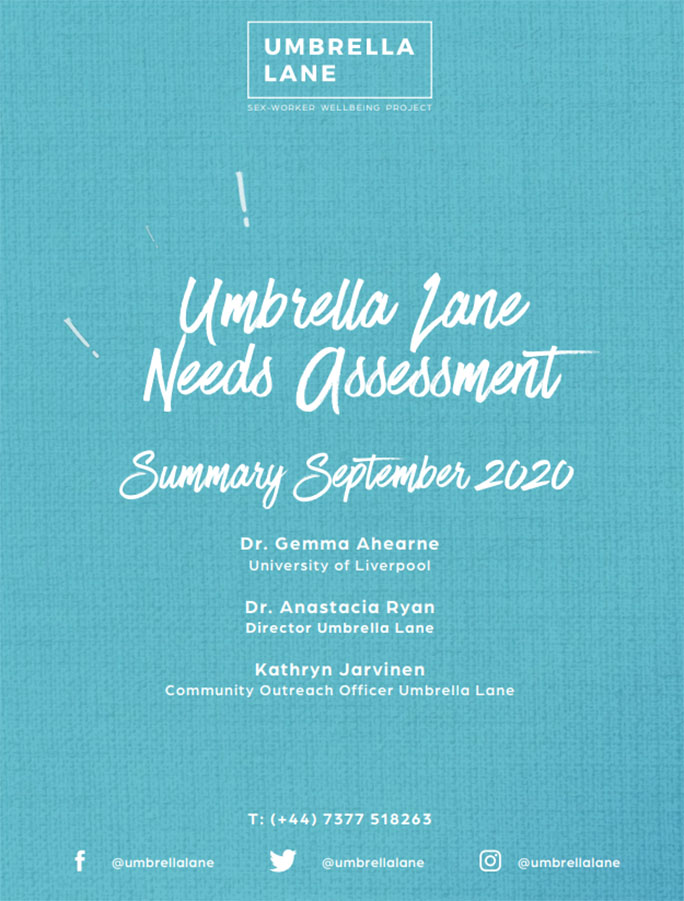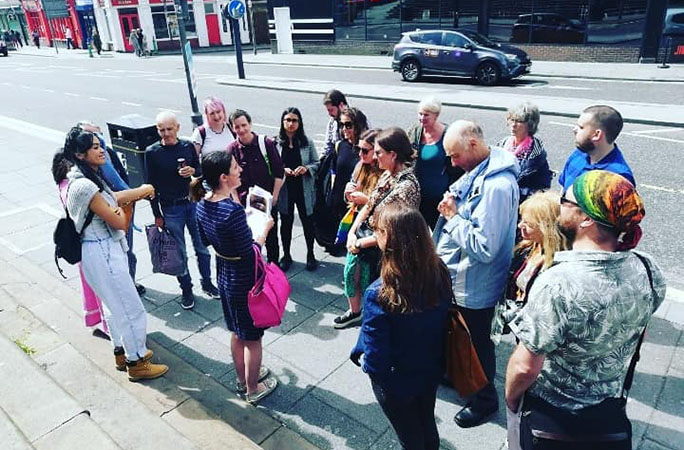Sex Workers and Covid-19
Posted on: 16 November 2020 by Dr Gemma Ahearne, University Teacher in the Department of Sociology, Social Policy and Criminology. in Blog

Dr Gemma Ahearne is a University Teacher in the Department of Sociology, Social Policy and Criminology. In this blog Gemma discusses the importance of research-led teaching, as well as her recent work designing and facilitating a Needs Assessment for Scottish sex worker charity, Umbrella Lane, in response to the Covid-19 pandemic.
I arrived at the University of Liverpool in September 2019 having previously held a lectureship at Liverpool John Moores University and having taught at Leeds Beckett University. It was important for me to develop my own specialist module as soon as possible. I talk about my module SOCI349 Crime, Justice and the Sex Industry in a recent blog post for the School: Crime, Justice and the Sex Industry blog

Dr Gemma Ahearne delivering a performative talk for the Into the Spotlight exhibition at Block Projects Sheffield, August 2019.
I have worked with the sex industry since 2002 and am committed to research-led teaching. I am a member of the Sex Work Research Hub and sit on the National Student Sex Work Strategy Coordination Group. I am also a Trustee for Basis, a large sex work charity in Leeds.
During the summer I was commissioned by Scottish sex worker charity Umbrella Lane to design and facilitate their Needs Assessment. This was a huge honor given my respect for grassroots sex worker organizations. COVID-19 has disproportionately impacted sex workers, who have been prevented from working under lockdown and social distancing rules.
The Needs Assessment was a mixed methods study. The co-authors of the report were Dr Anastacia Ryan who is Director of Umbrella Lane and Kathryn Jarvinen the Community Outreach Officer. Ryan and Jarvinen had already undertaken a survey element of the research, so my qualitative research design built on this survey.

Umbrella Lane Needs Assessment: Summary September 2020
Conducting research during a global pandemic required shifting our interviews to Zoom and embracing the digital. Sex workers too are being displaced to online settings, with workers using online tools and cash apps to earn a living during COVID. Sex workers are increasingly being prevented from using online payment facilities and social media platforms for advertising. These are examples of the partial-criminalization of sex work, or rather the ‘grey area’ of the law. Consensual sex work is often conflated with sexual exploitation and trafficking. As such, sex workers find themselves being regulated and policed under the guise of concern and protection.
The findings showed that stigma for sex workers remains a barrier to accessing health care and support services. Another key issue was the sense of belonging and peer support from the sex worker community.
I welcome contact from staff and students across the university who would like to know more about the study, sex work in general, or my module SOCI349 Crime, Justice and the Sex Industry.

Dr Gemma Ahearne delivers a guided walk of sexual entertainment venues as commissioned by FACT for the 'Real Work' exhibition, August 2019.
Dr Gemma Ahearne is a University Teacher in the Department of Sociology, Social Policy and Criminology.
You can follow her on Twitter: @princessjack
You can also read her blog: www.plasticdollheads.wordpress.com/
If you are interested in studying within the Department of Sociology, Social Policy and Criminology visit our study pages.
Keywords: Sociology, Sex Workers, Sex Industry, Activism, Research, Research-Led Teaching, Social Justice.